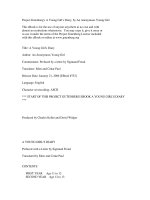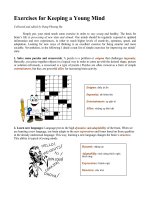A Young Girl's Diary
Bạn đang xem bản rút gọn của tài liệu. Xem và tải ngay bản đầy đủ của tài liệu tại đây (64.99 KB, 11 trang )
Project Gutenberg's A Young Girl's Diary, by An Anonymous Young Girl
This eBook is for the use of anyone anywhere at no cost and with
almost no restrictions whatsoever. You may copy it, give it away or
re-use it under the terms of the Project Gutenberg License included
with this eBook or online at www.gutenberg.org
Title: A Young Girl's Diary
Author: An Anonymous Young Girl
Commentator: Prefaced by a letter by Sigmund Freud
Translator: Eden and Cedar Paul
Release Date: January 21, 2006 [EBook #752]
Language: English
Character set encoding: ASCII
*** START OF THIS PROJECT GUTENBERG EBOOK A YOUNG GIRL'S DIARY
***
Produced by Charles Keller and David Widger
A YOUNG GIRL'S DIARY
Prefaced with a Letter by Sigmund Freud
Translated by Eden and Cedar Paul
CONTENTS
FIRST YEAR Age 11 to 12
SECOND YEAR Age 12 to 13
THIRD YEAR Age 13 to 14
LAST HALF-YEAR Age 14 to 14 1/2
CONCLUSION
PREFACE
THE best preface to this journal written by a young girl belonging to
the upper middle class is a letter by Sigmund Freud dated April 27,
1915, a letter wherein the distinguished Viennese psychologist testifies
to the permanent value of the document:
"This diary is a gem. Never before, I believe, has anything been written
enabling us to see so clearly into the soul of a young girl, belonging
to our social and cultural stratum, during the years of puberal
development. We are shown how the sentiments pass from the simple egoism
of childhood to attain maturity; how the relationships to parents
and other members of the family first shape themselves, and how they
gradually become more serious and more intimate; how friendships are
formed and broken. We are shown the dawn of love, feeling out towards
its first objects. Above all, we are shown how the mystery of the sexual
life first presses itself vaguely on the attention, and then takes
entire possession of the growing intelligence, so that the child suffers
under the load of secret knowledge but gradually becomes enabled to
shoulder the burden. Of all these things we have a description at once
so charming, so serious, and so artless, that it cannot fail to be of
supreme interest to educationists and psychologists.
"It is certainly incumbent on you to publish the diary. All students of
my own writings will be grateful to you."
In preparing these pages for the press, the editor has toned down
nothing, has added nothing, and has suppressed nothing. The only
alterations she has made have been such as were essential to conceal the
identity of the writer and of other persons mentioned in the document.
Consequently, surnames, Christian names, and names of places, have been
changed. These modifications have enabled the original author of the
diary to allow me to place it at the free disposal of serious readers.
No attempt has been made to correct trifling faults in grammar and other
inelegancies of style. For the most part, these must not be regarded
as the expression of a child's incapacity for the control of language.
Rather must they be looked upon as manifestations of affective
trends, as errors in functioning brought about by the influence of the
Unconscious.
THE EDITOR. VIENNA, _Autumn_, 1919.
FIRST YEAR, AGE ELEVEN TO TWELVE
FIRST YEAR
July 12, 19 . . . Hella and I are writing a diary. We both agreed that
when we went to the high school we would write a diary every day. Dora
keeps a diary too, but she gets furious if I look at it. I call Helene
"Hella," and she calls me "Rita;" Helene and Grete are so vulgar. Dora
has taken to calling herself "Thea," but I go on calling her "Dora." She
says that little children (she means me and Hella) ought not to keep a
diary. She says they will write such a lot of nonsense. No more than in
hers and Lizzi's.
July 13th. Really we were not to begin writing until after the holidays,
but since we are both going away, we are beginning now. Then we shall
know what we have been doing in the holidays.
The day before yesterday we had an entrance examination, it was very
easy, in dictation I made only 1 mistake--writing _ihn_ without _h_. The
mistress said that didn't matter, I had only made a slip. That is quite
true, for I know well enough that _ihn_ has an _h_ in it. We were both
dressed in white with rose-coloured ribbons, and everyone believed
we were sisters or at least cousins. It would be very nice to have
a cousin. But it's still nicer to have a friend, for we can tell one
another everything.
July 14th. The mistress was very kind. Because of her Hella and I are
really sorry that we are not going to a middle school. Then every
day before lessons began we could have had a talk with her in the
class-room. But we're awfully pleased because of the other girls. One is
more important when one goes to the high school instead of only to
the middle school. That is why the girls are in such a rage. "They are
bursting with pride" (that's what my sister says of me and Hella, but
it is not true). "Our two students" said the mistress when we came away.
She told us to write to her from the country. I shall.
July 15th. Lizzi, Hella's sister, is not so horrid as Dora, she
is always so nice! To-day she gave each of us at least ten
chocolate-creams. It's true Hella often says to me: "You don't know her,
what a beast she can be. _Your_ sister is generally very nice to me."
Certainly it is very funny the way in which she always speaks of us as
"the little ones" or "the children," as if she had never been a child
herself, and indeed a much littler one than we are. Besides we're just
the same as she is now. She is in the fourth class and we are in the
first.
To-morrow we are going to Kaltenbach in Tyrol. I'm frightfully excited.
Hella went away to-day to Hungary to her uncle and aunt with her mother
and Lizzi. Her father is at manoeuvres.
July 19th. It's awfully hard to write every day in the holidays.
Everything is so new and one has no time to write. We are living in a
big house in the forest. Dora bagged the front veranda straight off
for her own writing. At the back of the house there are such swarms of
horrid little flies; everything is black with flies. I do hate flies and
such things. I'm not going to put up with being driven out of the
front veranda. I won't have it. Besides, Father said: "Don't quarrel,
children!" (_Children_ to _her_ too!!) He's quite right. She puts
on such airs because she'll be fourteen in October. "The verandas are
common property," said Father. Father's always so just. He never lets
Dora lord it over me, but Mother often makes a favourite of Dora. I'm
writing to Hella to-day. She's not written to me yet.
July 21st. Hella has written to me, 4 pages, and such a jolly letter. I
don't know what I should do without her! Perhaps she will come here in
August or perhaps I shall go to stay with her. I think I would rather go
to stay with her. I like paying long visits. Father said: "We'll see,"
and that means he'll let me go. When Father and Mother say We'll see it
really means Yes; but they won't say "yes" so that if it does not come
off one can't say that they haven't kept their word. Father really lets
me do anything I like, but not Mother. Still, if I practice my piano
regularly perhaps she'll let me go. I must go for a walk.
July 22nd. Hella wrote that I positively must write every day, for one
must keep a promise and we swore to write every day. I. . . .
July 23rd. It's awful. One has no time. Yesterday when I wanted to write
the room had to be cleaned and D. was in the arbour. Before that I had
not written a _single_ word and in the front veranda all my pages blew
away. We write on loose pages. Hella thinks it's better because then one
does not have to tear anything out. But we have promised one another to
throw nothing away and not to tear anything up. Why should we? One can
tell a friend everything. A pretty friend if one couldn't. Yesterday
when I wanted to go into the arbour Dora glared at me savagely, saying
What do you want? As if the arbour belonged to her, just as she wanted
to bag the front veranda all for herself. She's too sickening.
Yesterday afternoon we were on the Kolber-Kogel. It was lovely. Father
was awfully jolly and we pelted one another with pine-cones. It was
jolly. I threw one at Dora and it hit her on her padded bust. She let
out such a yell and I said out loud You couldn't feel it _there_. As she
went by she said Pig! It doesn't matter, for I know she understood me
and that what I said was true. I should like to know what _she_ writes
about every day to Erika and what she writes in her diary. Mother was
out of sorts and stayed at home.
July 24th. To-day is Sunday. I do love Sundays. Father says: You
children have Sundays every day. That's quite true in the holidays, but
not at other times. The peasants and their wives and children are all
very gay, wearing Tyrolese dresses, just like those I have seen in the
theatre. We are wearing our white dresses to-day, and I have made a
great cherrystain upon mine, not on purpose, but because I sat down upon
some fallen cherries. So this afternoon when we go out walking I must
wear my pink dress. All the better, for I don't care to be dressed
exactly the same as Dora. I don't see why everyone should know that
we are sisters. Let people think we are cousins. She does not like it
either; I wish I knew why.
Oswald is coming in a week, and I am awfully pleased. He is older than
Dora, but I can always get on with him. Hella writes that she finds it
dull without me; so do I.
July 25th. I wrote to Fraulein Pruckl to-day. She is staying at
Achensee. I should like to see her. Every afternoon we bathe and then
go for a walk. But to-day it has been raining all day. Such a bore. I
forgot to bring my paint-box and I'm not allowed to read all day. Mother
says, if you gobble all your books up now you'll have nothing left to
read. That's quite true, but I can't even go and swing.
Afternoon. I must write some more. I've had a frightful row with Dora.
She says I've been fiddling with her things. It's all because she's so
untidy. As if _her_ things could interest me. Yesterday she left her
letter to Erika lying about on the table, and all I read was: He's as
handsome as a Greek god. I don't know who "he" was for she came in at
that moment. It's probably Krail Rudi, with whom she is everlastingly
playing tennis and carries on like anything. As for handsome--well,
there's no accounting for tastes.
July 26th. It's a good thing I brought my dolls' portmanteau. Mother









